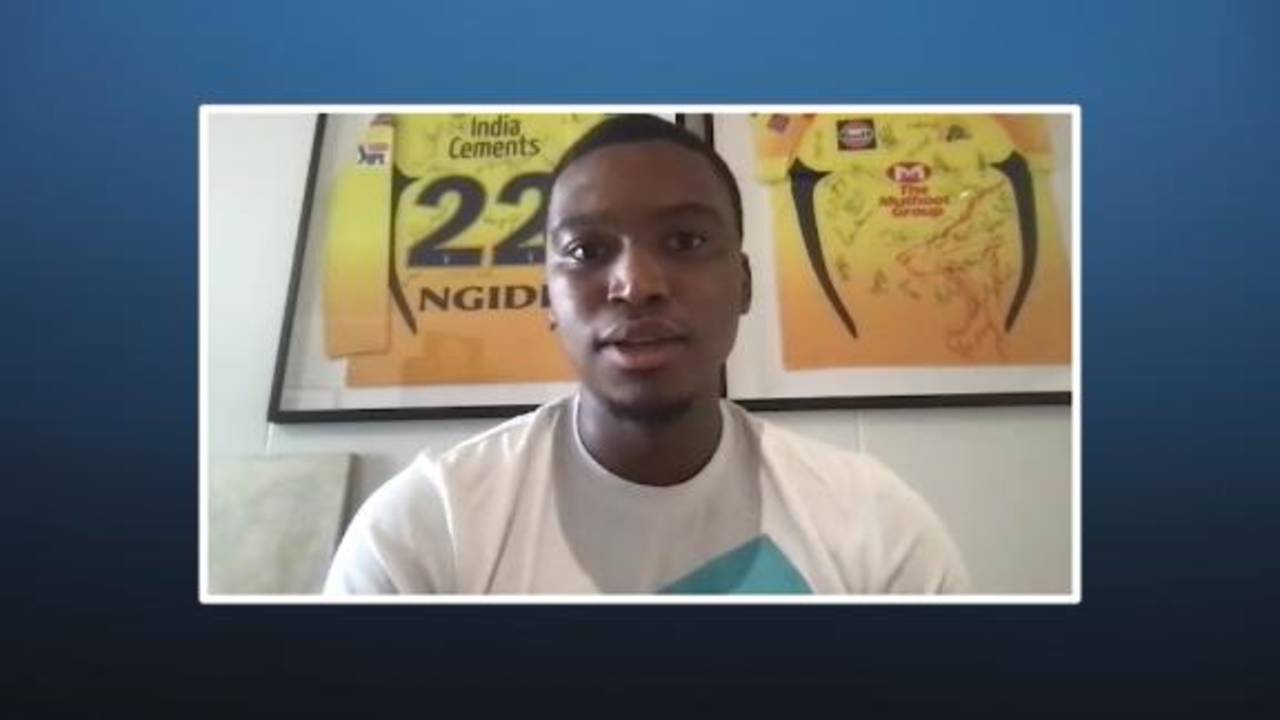Lungi Ngidi speaks out against gender-based violence: 'I believe sport has the ability to effect change'
The South Africa fast bowler has partnered with a United Nations initiative for the cause
Firdose Moonda
Dec 7, 2021, 9:35 AM
On average, a woman is murdered in South Africa in the time it takes for a T20 match to be played. Over the course of an ODI, two women die. Those are numbers Lungi Ngidi finds hard to ignore.
"A woman is killed every four hours in South Africa. That is unbelievable. Mentally, I can't grasp it," Ngidi said to ESPNcricinfo. "Just hearing things like that and knowing I have my own mother, cousins, sisters and female friends, it shocks me. It's not something that you want to be sitting worrying about every day, so something needs to be done about it."
Ngidi's remarks have come during the annual international campaign against gender-based violence, instituted by the United Nations, that takes place between November 25 and December 10, but he has been thinking about the impact of gender-based violence for months.
"This is something that really took off during the lockdown period for me. We are always so busy, we don't really get time to read up on the stuff that's happening in the country, but during that period this was something that was highlighted and it stuck out like a sore thumb," he said.
Many countries reported an increase in domestic abuse during the hard lockdowns of 2020. South Africa confirmed more than 120,000 cases in the first 21-day shutdown. Police figures say 53,293 sexual offences were reported in 2019-20 in the country, an average of 146 per day, up from 52,420 in 2018-19 (143 per day). Most of these were cases of rape: the police recorded 42,289 rapes in 2019-20, nearly 116 per day, up from 41,583 in 2018-19.
"I felt that in some way I could contribute and I could make some sort of difference," Ngidi said. "The main thing is trying to make sure it's no longer just lip service and that there's actually something being done. And those who have the power to actually make sure are being held accountable."
Ngidi will be partnering with the United Nations Women for Change programme and the Uyinene Mrwetyana Foundation, set up in memory of the 19-year-old student of that name who was sexually assaulted and murdered in Cape Town in August 2019, sparking nation-wide protests against the abuse of women.
Mrwetyana was also honoured by Springbok rugby player Makazole Mapimpi, who wore a wristband with her name on it at the 2019 rugby World Cup. "With Mapimpi, the tribute to Uyinene was a massive statement because it happened on a stage like that," Ngidi said. "This is why I believe sport has the ability to effect change. Just that little gesture brought a lot of attention and some people who didn't know [now] know what happened."
Protest in sport against social discrimination has become common over the last 18 months, since the murder of George Floyd and the rise of the antiracism movement. In South Africa it was Ngidi who sparked a dialogue with the Black Lives Matter movement when he answered a question at a press engagement last July, shortly after England and West Indies became the first international teams to take a knee.
"As someone who can influence change, I feel it's one of my responsibilities to say something"
"As a nation, we have a past that is very difficult, with racial discrimination, so it's definitely something we will be addressing as a team, and if we are not, it's something I will bring up. It's something that we need to take very seriously, and like the rest of the world is doing, make the stand," he said at the time.
It has taken the South African men's team 15 months and a board-mandated instruction to reach the point where they are collectively making the gesture. Through that period, Ngidi has been one of the players who has been steadfast in taking the knee on every occasion he could, and in speaking out about injustice.
"The way I was raised is to speak about something if it's not right," he said. "I believe I have the responsibility as someone who plays for the national team. As someone who can influence change, I feel it's one of my responsibilities to say something.
"It's not like I am out here looking for attention or trying to rally other people to do what I believe in, but this is what I believe in and I can see there's other people affected by this as well. I will do as best as I can to try and effect some change."
Ngidi's work against gender-based violence will focus on education and support for those who are abused, and for the perpetrators of that abuse, he said. "Fundraising is important but the main objective is to start seeing a difference in terms of what is actually being done instead of just financial donations. To actually physically do stuff is the most important."
South Africa's statistics of violence against women are a consequence perhaps of the overarching environment of toxic masculinity in the country. Ngidi said he "could never explain" why crimes against women take place but that he wants to understand and prevent them from happening as frequently.
Firdose Moonda is ESPNcricinfo's South Africa correspondent

